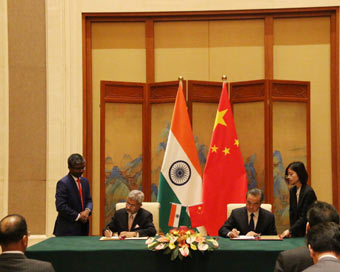 PM Modi visit USA
PM Modi visit USA Only the mirror in my washroom and phone gallery see the crazy me : Sara Khan
Only the mirror in my washroom and phone gallery see the crazy me : Sara Khan Karnataka rain fury: Photos of flooded streets, uprooted trees
Karnataka rain fury: Photos of flooded streets, uprooted trees Cannes 2022: Deepika Padukone stuns at the French Riviera in Sabyasachi outfit
Cannes 2022: Deepika Padukone stuns at the French Riviera in Sabyasachi outfit Ranbir Kapoor And Alia Bhatt's Wedding Pics - Sealed With A Kiss
Ranbir Kapoor And Alia Bhatt's Wedding Pics - Sealed With A Kiss Oscars 2022: Every Academy Award Winner
Oscars 2022: Every Academy Award Winner Shane Warne (1969-2022): Australian cricket legend's life in pictures
Shane Warne (1969-2022): Australian cricket legend's life in pictures Photos: What Russia's invasion of Ukraine looks like on the ground
Photos: What Russia's invasion of Ukraine looks like on the ground Lata Mangeshkar (1929-2022): A pictorial tribute to the 'Nightingale of India'
Lata Mangeshkar (1929-2022): A pictorial tribute to the 'Nightingale of India' PM Modi unveils 216-feet tall Statue of Equality in Hyderabad (PHOTOS)
PM Modi unveils 216-feet tall Statue of Equality in Hyderabad (PHOTOS)The Badminton Association of India (BAI) has announced a 14-member-strong India squad for
- Men’s Sr Hockey Nationals to be played in division-based format from April 4
- Mensik denies Djokovic 100th title in Miami final
- KIPG: Son of a vegetable vendor, Bihar’s Jhandu Kumar eyes Worlds, 2028 Paralympics
- Hardik Singh credits hard work and team unity for receiving HI Midfielder of the Year award
- Djokovic, Alcaraz land in same half of Miami draw
Let differences not become disputes: India tells China Last Updated : 13 Aug 2019 04:32:49 AM IST 
Beijing: External Affairs Minister S Jaishankar and his Chinese counterpart Wang Yi during the agreement signing ceremony in Beijing on Aug 12, 2019. (Photo: IANS/MEA) The future of Sino-Indian ties depends on mutual sensitivity to each other's core concerns and it's vital to "not let differences become disputes", External Affairs Minister S Jaishankar conveyed this to his Chinese counterpart Wang Yi, here on Monday, as the two sides met for the first time after exchanges became a bit frosty over the changed status of Jammu and Kashmir.
Jaishankar, here on a three-day visit, held talks with Wang, and the two sides also inked four agreements, including for cooperation in sports, cultural exchanges and traditional medicine.
The visit, meant to firm up the agenda for the second informal summit between Prime Minister Narendra Modi and Chinese President Xi Jinping, saw both sides discussing India's moves on Kashmir -- revocation of special status and its division into two for better governance.
India, which has firmly told China not to meddle in what is purely an internal matter after Beijing termed the creation of Ladakh UT as "unacceptable", on Monday sought to temper the bilateral coolness, and rather look at the breadth of their bilateral ties.
Succinctly putting forth the vision for the future of Sino-Indian ties, Jaishankar said, "The future of the relationship will obviously depend on mutual sensitivity to each other's core concerns. It's natural, both as neighbours and large developing economies, that there would be issues.
"Properly managing differences is therefore vital. As our leaders agreed in Astana, differences should not become disputes. That's how the relations can remain a factor of stability in an uncertain world.
"The positive direction of ties after the Wuhan Summit has opened up a world of new convergences. Exploiting this and taking our ties to a new level will require strong public support in both societies. The media can make a major contribution to that goal," he said.
Jaishankar's comments are significant as they also come three days after Wang's meeting with Pakistan Foreign Minister Shah Mahmood Qureshi, who sought Beijing's support in censuring India at the UN Security Council over Kashmir.
Addressing the second meeting of the India-China High Level Mechanism on Cultural and People-to-People Exchanges here, Jaishankar said he had held detailed and productive discussions with Wang.
"Our discussions today were especially significant as we prepare for President Xi Jinping's visit to India for the second Informal Summit later this year and celebrating the 70th anniversary of establishment of diplomatic relations next year," Jaishankar said during a meeting at the Diaoyutai State Guest House.
In his remarks, Wang said China was closely following the escalation of tensions between India and Pakistan and urged New Delhi to maintain peace and stability.
Wang said the two sides held in-depth talks, which were "especially important for the high level engagement for the second informal summit" between their leaders in October.
He said the two sides needed to strengthen economic cooperation mechanisms as well as defence engagements, and deepen trade relations.
"China appreciates India's concerns over trade imbalances", which was heavily tilted in Beijing's favour, Wang said.
He also said both sides must live by the UN charter and "respect sovereignty and territorial integrity of all countries and address all issues though dialogue".
On the unresolved boundary question, Wang said both sides would use the mechanism of the Special Representatives to seek early progress as well as the CBMs in place.
Earlier, Jaishankar met Chinese Vice-President Wang Qishan.
China has strongly backed its all-weather friend Pakistan over Kashmir, and voiced "serious concern" over the Kashmir situation, stressing that Kashmir is "a legacy of history between India and Pakistan".
Beijing also said New Delhi should avoid actions to "unilaterally change the status quo" of Kashmir.IANS Beijing For Latest Updates Please-
Join us on
Follow us on








172.31.16.186







